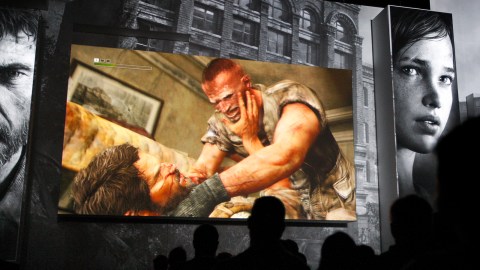“The Last of Us” shows how technology has changed humans as storytellers

- The intersection of two contemporary storytelling forms, captured perfectly in HBO's adaptation of the video game The Last of Us, shows how our ancient drive to tell stories continues to evolve.
- The key innovation in video games is that you, traditionally the viewer, enact the narrative. When done properly, you feel the consequences of the actions you take.
- Video game technology will continue to open up entirely new dimensions for storytelling.
Twenty thousand years ago, a small group of men and women worked their way deep into a cave system in the south of France. There, by the light of torches, they painted beautiful depictions of the animals they hunted. Their cave paintings remain as a tribute to the first technology humans developed: the story.
It is worth remembering how old and powerful stories are for human beings, like HBO’s successful adaptation of the video game The Last of Us. The intersection of these two storytelling forms — a streaming TV show and a console-based video game — allows us to see exactly how technology has reshaped our ancient drive to depict the world through narratives.
Enacting the narrative
Most people look at me a little weird when I reveal that I am an avid gamer. I guess there aren’t a lot of 60-year-old professors of astrophysics who spend six months in an open-world video game about, say, a future full of robot dinosaurs. While I did not start playing until my 40s, I quickly fell in love with what the form allowed. As someone interested in how technology shapes our imaginations, the specific way video games open up new dimensions in storytelling has always fascinated me. (That sense of wonder prevails even when I am deep into blasting away at those robot dinosaurs.) And that’s where The Last of Us comes into the picture.
I am not the only person who will tell you that we are talking about the greatest video game ever made. The Last of Us won all the awards to justify that claim. It is one of those games that rises to the level of high art. Yes, it is another story about a post-apocalyptic America where a virus has turned most of humanity into mindless zombies. And yes, in the game, you follow a man shepherding a teenage girl across the country to a facility where her immunity might be used to save our species.
If that blurb was all you knew about the narrative, you would be justified in rolling your eyes and moving on. Instead, The Last of Us uses this well-worn idea to develop a deep and richly textured story about loss and sadness. Most important, it does so in a way that is only possible in the format of a video game.
The difference between a game and a traditional storytelling format like a novel is that in a game you must enact the narrative. You are the character, in the sense that your actions are their actions. In lesser hands, this may not mean much. But the creators of The Last of Us were brilliant in their ability to draw the player into the consequences of the actions they choose. The world of The Last of Us contains a lot of violence. So do a great many games. But unlike other games, you are forced to deal with its impact. The game does not let you look away, which is why playing it is not an easy task. The Last of Us is brilliant and compelling, but you cannot say that it’s fun.
That is what makes the comparison with HBO’s version of the story so interesting. There has been a lot of discussion of how hard it has been to convert successful video games into successful movies or TV series, even though on the surface the two forms seem very similar. The creators of this series, however, made deft decisions about which aspects of the story needed to change in order to serve the new medium. They managed to take what matters for the Last of Us story as pure story and shift it into the language of a TV series (which is quite different from the language of video games).
Why video games matter to storytelling
In that shift, you can see exactly why video game technology opens up entirely new dimensions for storytelling. As my friend Gourab Ghoshal points out, there are scenes in the show that hew closely to scenes in the game. The big difference is that the TV show spends just five minutes in the room where that scene plays out.
I, however, have harrowing memories from the week I spent in that same room, trying to cross it without getting killed by quick moving, ferocious zombies. As a gamer, I had an entirely different experience of that scene. In the game, it plays the same role in the narrative arc of the story as it does in the TV adaptation, but the difficulty and horror I experienced by playing rather than just watching left an emotional resonance that weighed deeply on me.
Add that scene to all the others spent in a game that took me a few months to complete, and my encounter with The Last of Us as a story seems far more potent than the TV series can ever hope to achieve, no matter how excellent it turns out to be. That is why video games matter and why their continued technological and artistic development can reshape the way we satisfy our ancient need for stories.





